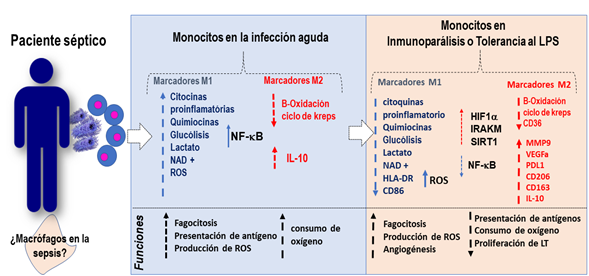Influencia del inmuno-metabolismo macrofágico en la sepsis humana: un nuevo paradigma
DOI:
https://doi.org/10.54502/msuceva.v1n1a4Palabras clave:
Enfoque terapéutico, Inmunometabolismo macrofágico, Reprogramación inmunometabólica, Respuesta inmune, Sepsis humanaResumen
El objetivo de esta reflexión es resaltar la importancia de la influencia del inmunometabolismo macrofágico y su respuesta dirigida a la sepsis humana como un enfoque terapéutico en el futuro cercano. La sepsis es un problema significativo de salud pública en todo el mundo. A pesar de su existencia desde la época de Hipócrates (470 a.C.), la sepsis continua siendo un problema clínico de marcada importancia con relevante crecimiento y tasas significativas de incidencia a nivel mundial. La exploración de las vías inmunometabólicas en la sepsis, es un área importante de investigación y la focalización en las vías metabólicas, puede representar una estrategia novedosa y prometedora como terapia de la sepsis. Por lo tanto, es vital el comprender la reprogramación inmunometabólica durante la sepsis para diseñar futuras terapias basadas en objetivos en función de la gravedad. Avances en las nuevas tecnologías como la secuenciación genética, la generación de proteínas recombinantes, citometría de flujo, terapia génica, entre otras, han permitido elucidar un concepto más multidisciplinar de la sepsis y se entiende con mayor precisión, que es un proceso que altera las vías metabólicas relacionadas con la inflamación; volviéndose claramente vital, para potenciar un enfoque terapéutico que busca restaurar el sistema inmunológico del paciente séptico,.
Descargas
Métricas
Citas
World Health Organization (WHO). https://mca.essensys.ro/news-room/fact-sheets/detail/sepsis.
Fleischmann C, Scherag A, Adhikari NKJ, Hartog CS, Tsaganos T, Schlattmann P, et al. Assessment of global incidence and mortality of hospital-treated sepsis. Current estimates and limitations. American Journal of Respiratory and Critical Care Medicine 2016;193. https://doi.org/10.1164/rccm.201504-0781OC.
Rhodes A, Evans LE, Alhazzani W, Levy MM, Antonelli M, Ferrer R, et al. Surviving sepsis campaign: international guidelines for management of sepsis and septic shock: 2016. Intensive Care Medicine 2017;43. https://doi.org/10.1007/s00134-017-4683-6.
Weiss SL, Peters MJ, Alhazzani W, Agus MSD, Flori HR, Inwald DP, et al. Surviving sepsis campaign international guidelines for the management of septic shock and sepsis associated organ dysfunction in children. Intensive Care Medicine 2020;46. https://doi.org/10.1007/s00134-019-05878-6.
Rudd KE, Johnson SC, Agesa KM, Shackelford KA, Tsoi D, Kievlan DR, et al. Global, regional, and national sepsis incidence and mortality, 1990–2017: analysis for the Global Burden of Disease Study. The Lancet 2020;395. https://doi.org/10.1016/S0140-6736(19)32989-7.
Machado FR, Cavalcanti AB, Bozza FA, Ferreira EM, Angotti Carrara FS, Sousa JL, et al. The epidemiology of sepsis in Brazilian intensive care units (the Sepsis prevalence assessment database, spread): an observational study. The Lancet Infectious Diseases 2017;17. https://doi.org/10.1016/S1473-3099(17)30322-5.
Rudd KE, Kissoon N, Limmathurotsakul D, Bory S, Mutahunga B, Seymour CW, et al. The global burden of sepsis: barriers and potential solutions. Critical Care 2018;22. https://doi.org/10.1186/s13054-018-2157-z.
Paoli CJ, Reynolds MA, Sinha M, Gitlin M, Crouser E. Epidemiology and Costs of Sepsis in the United States—An analysis based on timing of diagnosis and severity level*. Critical Care Medicine 2018;46. https://doi.org/10.1097/CCM.0000000000003342.
Hotchkiss RS, Moldawer LL, Opal SM, Reinhart K, Turnbull IR, Vincent J-L. Sepsis and septic shock. Nature Reviews Disease Primers 2016;2. https://doi.org/10.1038/nrdp.2016.45.
Bouza C, López-Cuadrado T. Epidemiology and trends of sepsis in young adults aged 20–44 years: A nationwide population-based study. Journal of Clinical Medicine 2019;9. https://doi.org/10.3390/jcm9010077.
Arts RJW, Gresnigt MS, Joosten LAB, Netea MG. Cellular metabolism of myeloid cells in sepsis. Journal of Leukocyte Biology 2017;101. https://doi.org/10.1189/jlb.4MR0216-066R.
O’Neill LAJ, Kishton RJ, Rathmell J. A guide to immunometabolism for immunologists. Nature Reviews Immunology 2016;16. https://doi.org/10.1038/nri.2016.70.
Geeraerts X, Bolli E, Fendt S-M, van Ginderachter JA. Macrophage metabolism as therapeutic target for cancer, atherosclerosis, and obesity. Frontiers in Immunology 2017;8. https://doi.org/10.3389/fimmu.2017.00289.
Diskin C, Pålsson-McDermott EM. Metabolic modulation in macrophage effector function. Frontiers in Immunology 2018;9. https://doi.org/10.3389/fimmu.2018.00270.
van Wyngene L, Vandewalle J, Libert C. Reprogramming of basic metabolic pathways in microbial sepsis: therapeutic targets at last? EMBO Molecular Medicine 2018;10. https://doi.org/10.15252/emmm.201708712.
Batista-González A, Vidal R, Criollo A, Carreño LJ. New Insights on the role of lipid metabolism in the metabolic reprogramming of macrophages. Frontiers in Immunology 2020;10. https://doi.org/10.3389/fimmu.2019.02993.
Braga TT, Agudelo JSH, Camara NOS. Macrophages During the Fibrotic Process: M2 as Friend and Foe. Frontiers in Immunology 2015;6. https://doi.org/10.3389/fimmu.2015.00602.
Kumar V. Targeting macrophage immunometabolism: Dawn in the darkness of sepsis. International Immunopharmacology 2018;58. https://doi.org/10.1016/j.intimp.2018.03.005.
Venet F, Lukaszewicz A-C, Payen D, Hotchkiss R, Monneret G. Monitoring the immune response in sepsis: a rational approach to administration of immunoadjuvant therapies. Current Opinion in Immunology 2013;25. https://doi.org/10.1016/j.coi.2013.05.006.
Denstaedt SJ, Singer BH, Standiford TJ. Sepsis and nosocomial infection: patient characteristics, mechanisms, and modulation. Frontiers in Immunology 2018;9. https://doi.org/10.3389/fimmu.2018.02446.
Ono S, Tsujimoto H, Hiraki S, Aosasa S. Mechanisms of sepsis induced immunosuppression and immunological modification therapies for sepsis. Annals of Gastroenterological Surgery 2018;2. https://doi.org/10.1002/ags3.12194.
Shalova IN, Lim JY, Chittezhath M, Zinkernagel AS, Beasley F, Hernández-Jiménez E, et al. Human monocytes undergo functional re-programming during sepsis mediated by hypoxia-inducible factor-1α. immunity 2015;42. https://doi.org/10.1016/j.immuni.2015.02.001.
Esquerdo KF, Sharma NK, Brunialti MKC, Baggio-Zappia GL, Assunção M, Azevedo LCP, et al. Inflammasome gene profile is modulated in septic patients, with a greater magnitude in non-survivors. Clinical & Experimental Immunology 2017;189. https://doi.org/10.1111/cei.12971.
Ferreira da Mota NV, Brunialti MKC, Santos SS, Machado FR, Assuncao M, Azevedo LCP, et al. Immunophenotyping of monocytes during human sepsis shows impairment in antigen presentation: a shift toward nonclassical differentiation and upregulation of FCγRi-receptor. Shock 2018;50. https://doi.org/10.1097/SHK.0000000000001078.
Rimmelé T, Payen D, Cantaluppi V, Marshall J, Gomez H, Gomez A, et al. Immune cell phenotype and function in sepsis. Shock (Augusta, Ga) 2016;45. https://doi.org/10.1097/SHK.0000000000000495.
Mussbacher M, Salzmann M, Brostjan C, Hoesel B, Schoergenhofer C, Datler H, et al. Cell type-specific roles of nf-κb linking inflammation and thrombosis. Frontiers in Immunology 2019;10. https://doi.org/10.3389/fimmu.2019.00085.
Salomao R, Brunialti MKC, Gomes NE, Mendes ME, Diaz RS, Komninakis S, et al. Toll-like receptor pathway signaling is differently regulated in neutrophils and peripheral mononuclear cells of patients with sepsis, severe sepsis, and septic shock*. Critical Care Medicine 2009;37. https://doi.org/10.1097/CCM.0b013e318192fbaf.
Weiss SL, Zhang D, Bush J, Graham K, Starr J, Murray J, et al. Mitochondrial dysfunction is associated with an immune paralysis phenotype in pediatric sepsis. Shock 2020;54. https://doi.org/10.1097/SHK.0000000000001486.
Netea MG, Joosten LAB, Latz E, Mills KHG, Natoli G, Stunnenberg HG, et al. Trained immunity: A program of innate immune memory in health and disease. Science 2016;352. https://doi.org/10.1126/science.aaf1098.
Cheng S-C, Scicluna BP, Arts RJW, Gresnigt MS, Lachmandas E, Giamarellos-Bourboulis EJ, et al. Broad defects in the energy metabolism of leukocytes underlie immunoparalysis in sepsis. Nature Immunology 2016;17. https://doi.org/10.1038/ni.3398.
Viola A, Munari F, Sánchez-Rodríguez R, Scolaro T, Castegna A. The metabolic signature of macrophage responses. Frontiers in Immunology 2019;10. https://doi.org/10.3389/fimmu.2019.01462.
Salomao R, Brunialti MKC, Rapozo MM, Baggio-Zappia GL, Galanos C, Freudenberg M. Bacterial sensing, cell signaling, and modulation of the immune response during sepsis. Shock 2012;38. https://doi.org/10.1097/SHK.0b013e318262c4b0.
López-Collazo E, del Fresno C. Pathophysiology of endotoxin tolerance: mechanisms and clinical consequences. Critical Care (London, England) 2013;17. https://doi.org/10.1186/cc13110.
Delano MJ, Ward PA. The immune system’s role in sepsis progression, resolution, and long-term outcome. Immunological Reviews 2016;274. https://doi.org/10.1111/imr.12499.
Stortz JA, Raymond SL, Mira JC, Moldawer LL, Mohr AM, Efron PA. Murine Models of Sepsis and Trauma: Can we bridge the gap? ILAR Journal 2017;58. https://doi.org/10.1093/ilar/ilx007.
Halbach JL, Wang AW, Hawisher D, Cauvi DM, Lizardo RE, Rosas J, et al. Why antibiotic treatment is not enough for sepsis resolution: An evaluation in an experimental animal model. Infection and Immunity 2017;85. https://doi.org/10.1128/IAI.00664-17.

Publicado
Cómo citar
Número
Sección
Licencia
Derechos de autor 2021 Magna Scientia UCEVA

Esta obra está bajo una licencia internacional Creative Commons Atribución-NoComercial-SinDerivadas 4.0.
Magna Scientia UCEVA proporciona un acceso abierto, libre y gratuito a su contenido, basado en el principio de que ofrecer al público un acceso libre a las investigaciones, ayuda a un mayor intercambio global del conocimiento. Lo cual, implica que los usuarios pueden leer, descargar, almacenar, imprimir, buscar, indexar y realizar enlaces a los textos completos de esta revista. Se permite distribuir los diversos artículos en las versiones post-print y oficial, sin previo permiso del autor o editor, considerando que el fin de este, no implica fines comerciales, ni la generación de obras derivadas; Solo se solicita la mención de la fuente así como la autoría. El titular del copyright será el o los autores que publiquen en Magna Scientia UCEVA.
Magna Scientia UCEVA está distribuida bajo los términos de la licencia https://creativecommons.org/licenses/by-nc-nd/4.0/deed.es




















